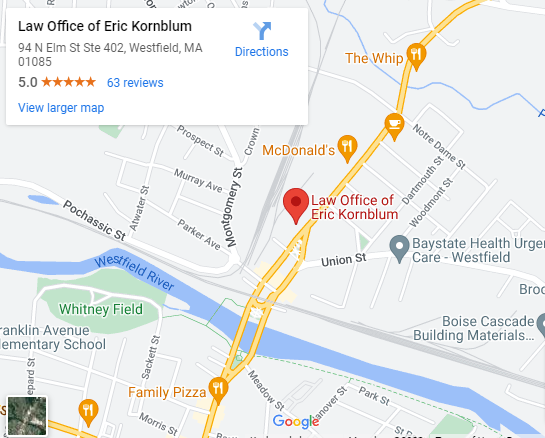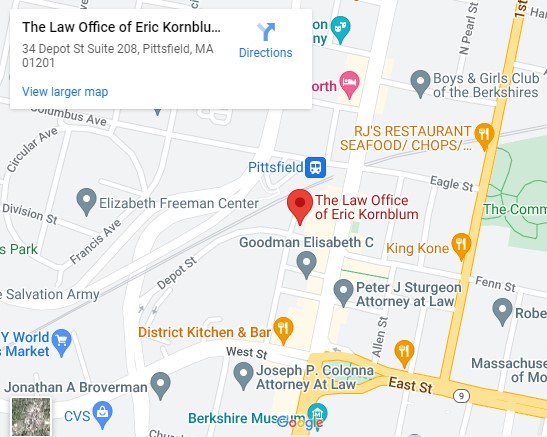Secure Your Home & Assets by Understanding Massachusetts Bankruptcy Homestead Law
The Massachusetts Bankruptcy Homestead Law protects some of the equity you have in your home. For most people, keeping their homes is a high priority during bankruptcy. Before filing for Chapter 7 or Chapter 13 bankruptcy, you must understand your potential homestead exemptions. If you are not sure what this means and you’re planning to file bankruptcy, make sure to consult with our Massachusetts bankruptcy law firm first!
The Law Office of Eric Kornblum can help you understand your options and guide you through the process. Our experienced bankruptcy attorneys have helped numerous clients protect their assets and get a fresh start. Schedule a conversation with us today to discuss your situation and learn how we can help you achieve financial freedom.
Why Do I Need a Bankruptcy Homestead Law Attorney in Massachusetts?
If you want to protect your home, you need someone who knows what to do. Sure, you can look it up online, but do you want to stake the value of your home on a random Google search?
Or would you rather have the legal advice of someone who lives and breathes the US bankruptcy code (including bankruptcy exemptions)?
Don’t take that risk. Work with a trusted Massachusetts homestead bankruptcy attorney to ensure everything goes right.
Eric Kornblum has helped many Bay Staters attain financial freedom. For over two decades, our law firm has guided people from the initial consultation all the way to the discharge of their debt, even beyond bankruptcy! We are happy to end the stress from your piling financial obligations.
By partnering up with us, we can work together to:
- Eliminate most (if not all) of your debts.
- Prevent foreclosure of your home
- Stop the repossession of your property
- Restore your terminated utilities
- End collection activities like debt collector harassment or wage garnishment
If you’re ready to start a debt-free life, schedule a conversation with us today!
What Is a Homestead?
If you own a piece of land with a house and other buildings, typically located in the countryside, then you may have what is called a homestead. Homesteads often include land for farming, ranching, gardening, or other productive uses. It can also be a single-family house, condominium, or up to four-unit multifamily property.

The term “homestead” also has legal implications. In Massachusetts, a homestead is a type of legal protection that can be used to shield a portion of a homeowner’s equity in their primary residence from certain types of creditors.
If you’re a homeowner in Massachusetts who is considering bankruptcy, it’s important to understand the state’s homestead exemption laws. A homestead exemption can help you protect some or all of the equity in your home from creditors during bankruptcy proceedings.
If you rent your residence, it is not eligible for the Massachusetts homestead exemption. However, you may be exempt from some amounts for rental payments.
Federal and Massachusetts Bankruptcy Homestead Law Protections
In Massachusetts, you can choose between federal or state exemption rules. While this article focuses on the Massachusetts bankruptcy homestead law, you also can elect to use the federal exemption system. Contact a Springfield debt attorney if you need help deciding which exemption system to use.
Here is an overview of the Federal Bankruptcy Code and Massachusetts state law:
- Federal Bankruptcy Homestead Law: The Federal Bankruptcy Code (11 U.S.C. § 522(d)(1)) provides a homestead exemption that protects a certain amount of equity in a debtor’s primary residence. The amount of the exemption changes periodically, but currently, it provides up to $25,150 of protection for an individual debtor and up to $50,300 for a married couple who file jointly. However, not all states allow debtors to use the federal exemption. If you reside in a state that has opted out of the federal exemption, you will need to use the state’s homestead exemption, if available.
- Massachusetts Bankruptcy Homestead Law: In Massachusetts, the homestead exemption law (Mass. General Laws c.188 § 1 & c.235 § 34) allows homeowners to protect up to $500,000 of equity in their primary residence from creditors during bankruptcy proceedings. To qualify for the exemption, you must have owned and lived in the property for at least 1215 days prior to filing for bankruptcy. If you’ve owned the property for less than 1215 days, the exemption amount is reduced based on the amount of time you have owned the property.
If you have questions about Massachusetts bankruptcy exemptions, you should start a conversation with Eric Kornblum. Call our law office today to learn more!
The Massachusetts Homestead Law and Houses Held in Trust
The protection offered by the Homestead Law may be limited if the home is held in a trust. In Massachusetts, if a home is held in a revocable trust, the homeowner may still be able to claim the homestead exemption. The homestead protection will remain in effect for the benefit of the trust beneficiary, who is deemed to be the owner of the property for purposes of the Homestead Law.
However, if the home is held in an irrevocable trust, the homestead exemption may not apply. This is because the homeowner no longer owns the property and is therefore not entitled to the protection of the Homestead Law. In some cases, the trust itself may be able to claim the homestead exemption, but this will depend on the specific terms of the trust and the laws of Massachusetts.
It’s important to note that the application of the Massachusetts Homestead Law to houses held in trust can be complex, and the information provided here is just a general overview. If you have specific questions or concerns about your Homestead Exemption or the impact of holding your home in a trust, it’s recommended that you consult with an experienced bankruptcy attorney. They can advise you on the best course of action to protect your home’s equity and ensure that your wishes are carried out according to your estate planning goals.
Additional Benefits for Disabled and Elderly Claimants
Unlike other exemptions, most married couples cannot double the state homestead exemption during bankruptcy. However, there is an important exception to this rule.
To qualify for this additional protection, you must also be either:
- At least 62 years of age; or
- Unable to engage in substantial gainful activity due to a medically determinable physical or mental impairment that has lasted or is expected to last for a continuous period of at least 12 months, or is expected to result in death.
If you are an elderly (at least 62 years old) or disabled homeowner, you and your spouse can combine your homestead exemptions.
Again, an experienced Springfield debt attorney can help you understand how to apply the exemptions to your claim.
Massachusetts Homestead Law and Protection From Nursing Home Bills
The Homestead Law in Massachusetts offers critical protection to homeowners against creditors’ claims, including nursing home bills. However, there are certain limitations to the law that homeowners should be aware of, particularly regarding the Massachusetts Department of Transitional Assistance (DTA), liens, and divorce.
First, it is important to note that the Homestead Law does not protect homeowners from liens imposed by the DTA. If a homeowner or their spouse receives Medicaid benefits from the DTA for nursing home care, the DTA may place a lien on the home to recover the cost of the care provided. The lien may not be enforced as long as the spouse is alive and living in the home, but it can be enforced after their death. Therefore, it is crucial to understand the impact of Medicaid on homestead protection and to plan accordingly.
Second, the Homestead Law may not protect a homeowner’s interest in the principal residence in cases of fraud or intentional wrongdoing. If a homeowner engaged in fraudulent activity or intentional wrongdoing, the Massachusetts Department of Revenue or the Internal Revenue Service may supersede the homestead protection to collect taxes owed.
Third, if a homeowner is going through a divorce, it is essential to understand how the Homestead Law may impact the distribution of assets. The law does not protect a homeowner’s interest in the principal residence if they are divorced or separated from their spouse, except in limited circumstances. For example, if the homeowner’s former spouse has a court-ordered obligation to pay support and the homestead is their primary residence, the homeowner may be able to retain the homestead protection.
Will Filing Bankruptcy Stop a Foreclosure?
Under federal law, an automatic stay is imposed after you file for bankruptcy. While your bankruptcy is pending, your creditors (including your mortgage holder) must pause their collection or foreclosure processes. While the automatic stay is not a long-term solution, it gives you and your bankruptcy lawyer time to assess your situation and work on eliminating your mortgage and other debts.
Does the Homestead Exemption Cover my Furniture and Appliances?
Massachusetts bankruptcy homestead law only covers the residence itself, not your personal property within the home. Instead, Massachusetts provides other exemptions that cover some of your furniture, appliances, trade tools, and personal property. If you have questions about these exemptions, contact a Springfield debt attorney for more information.
What are the Homestead Exemption laws in Massachusetts?
The Massachusetts homestead exemption can be found at Mass. General Laws Chapter 188, 1-14 on the Massachusetts Legislature’s website
Aside from Massachusetts Homestead Exemption, What Are the Other Massachusetts Bankruptcy Exemptions?
In addition to the Massachusetts Homestead Exemption, which protects a debtor’s primary residence, there are several other Massachusetts bankruptcy exemptions that can protect a debtor’s assets in bankruptcy. These exemptions include:
- Personal property exemption: This exemption protects up to $15,000 of a debtor’s personal property, such as furniture, appliances, and clothing.
- Tools of the trade exemption: This exemption protects up to $5,000 of a debtor’s tools and equipment that are necessary for their employment.
- Motor vehicle exemption: This exemption protects up to $7,500 of a debtor’s equity in one motor vehicle.
- Jewelry and heirloom exemption: This exemption protects up to $1,500 of a debtor’s jewelry and heirlooms.
- Wildcard exemption: This exemption can be used to protect any property that is not covered by the other exemptions. The wildcard exemption protects up to $1,000 of any property, plus up to $6,000 of unused homestead exemption.
It’s important to note that these exemptions are subject to certain limitations and restrictions, and some exemptions may not apply in certain circumstances. Consulting with a bankruptcy attorney can help you understand your options and protect your assets in bankruptcy.
When Should I File a Massachusetts Bankruptcy
If you think that the state’s exemption rules work best for you, you must ensure that you qualify first. To file for bankruptcy in Massachusetts, you must have lived in the state for more than 180 days. However, if you want to use the state’s exemptions, you’ll need to have lived there for at least 730 days before filing.
If you’ve lived in multiple states in the two years before the bankruptcy filing, the exemptions that apply would be that of the state you resided in most of the time.
If you want to know if you qualify for Massachusetts homestead exemptions, you can ask our Springfield bankruptcy attorney for assistance!
A Springfield Debt Attorney Can Help You Live Debt Free
It can be difficult to understand the Massachusetts bankruptcy homestead law. At the Law Office of Eric Kornblum, we use over 20 years of experience to guide our clients through bankruptcy. Our goal is to provide you with financial independence and peace of mind. Contact us today for a confidential assessment.
Eric Kornblum, a Massachusetts bankruptcy lawyer, is a member of the Massachusetts Bar Association, the Hampden County Bar Association, the Real Estate Bar Association, the National Association of Consumer Bankruptcy Attorneys, and the American Bankruptcy Institute.
Aside from homestead exemption, our Springfield attorney offers the following services:
Start on the road to financial freedom by calling our law firm today!

 MA bankruptcy lawyer Eric Kornblum graduated from State University of New York, Binghamton in 1989 and received his law degree in 1992 at Western New England College, School of Law. Since opening his own practice, Eric has been dedicated to helping his clients resolve their financial problems both in and out of court.
MA bankruptcy lawyer Eric Kornblum graduated from State University of New York, Binghamton in 1989 and received his law degree in 1992 at Western New England College, School of Law. Since opening his own practice, Eric has been dedicated to helping his clients resolve their financial problems both in and out of court. 
